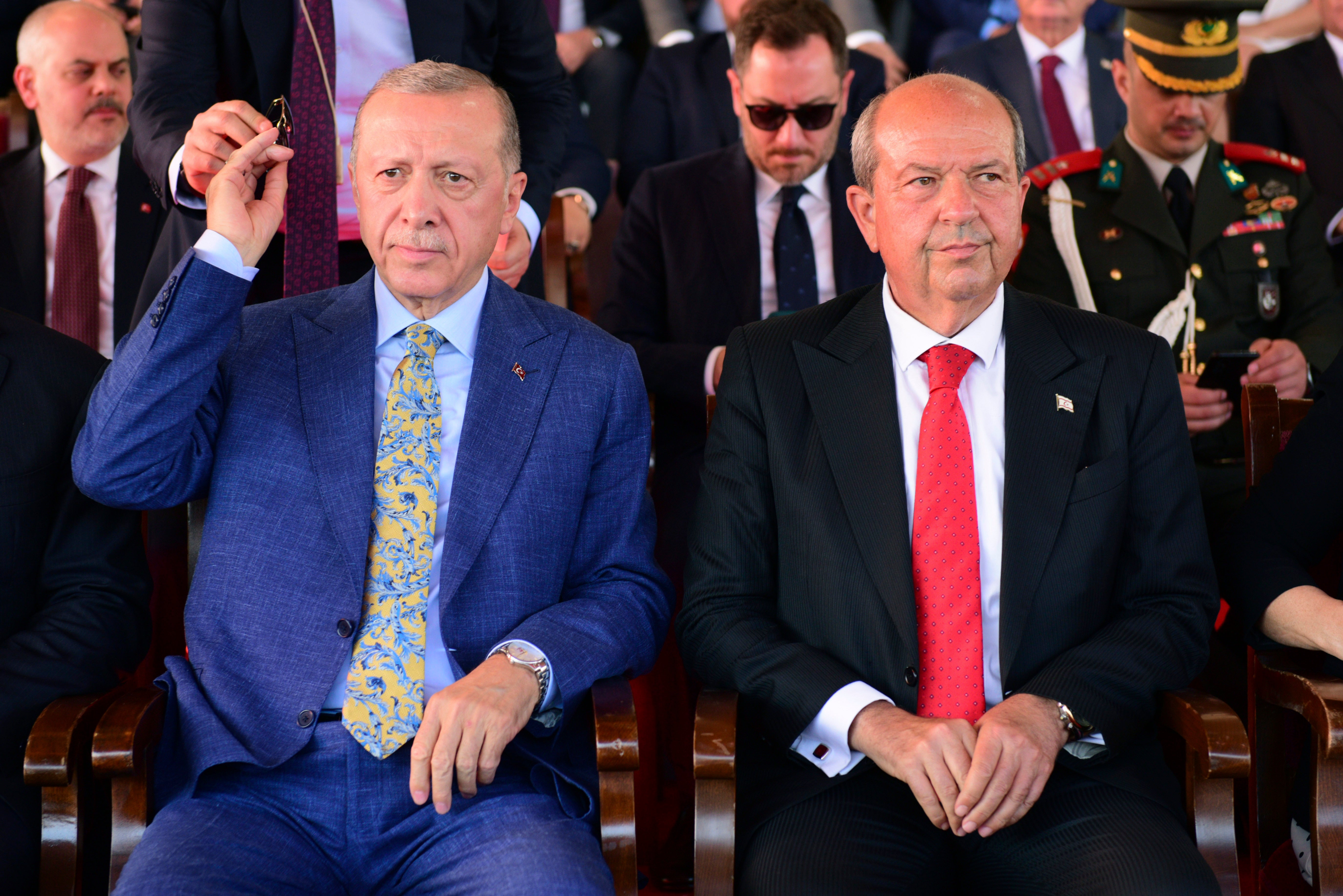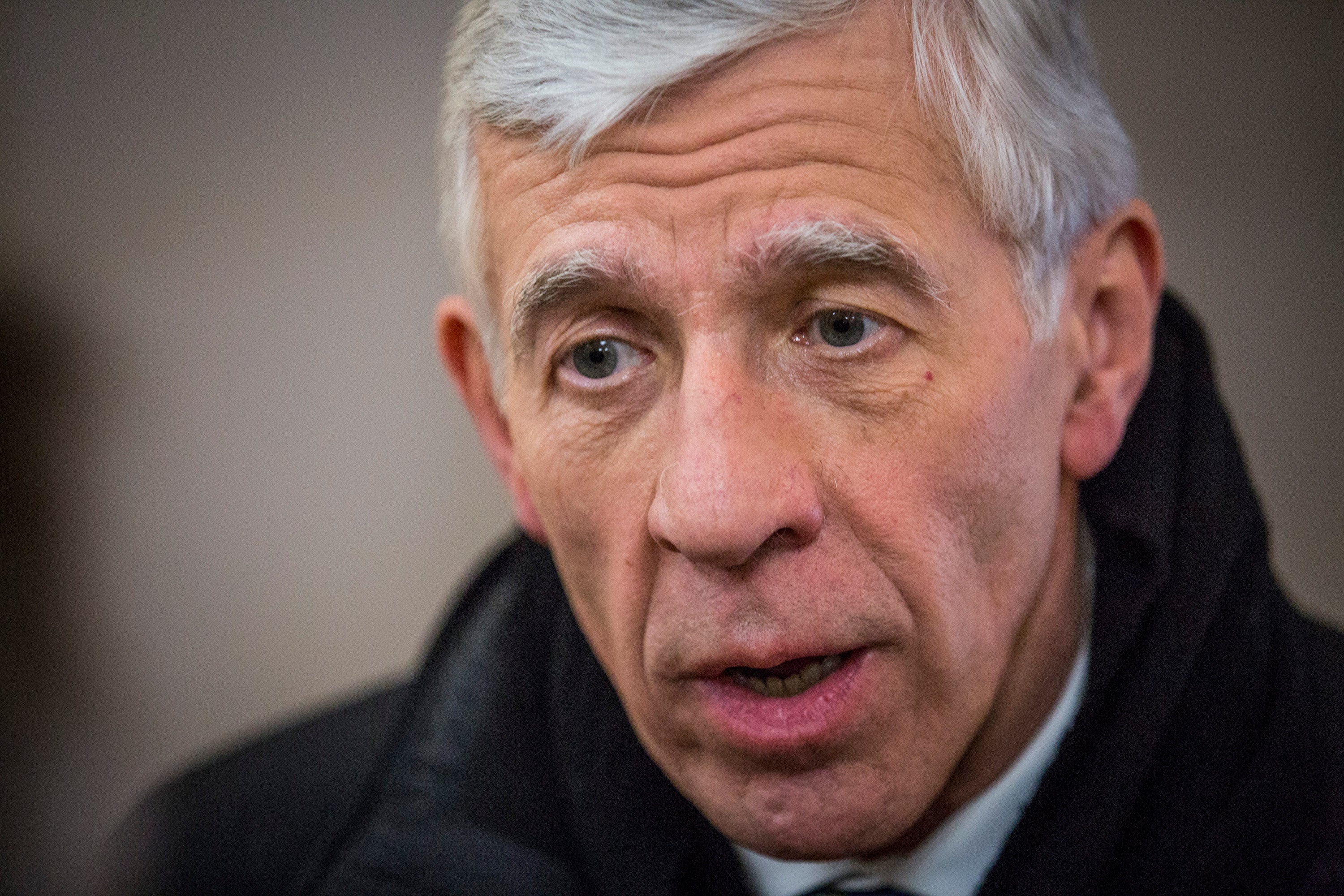Turkey’s president Recep Tayyip Erdogan will lead celebrations of the anniversary of his country’s intervention 50 years ago, which left the island of Cyprus split in two.
Thousands of mostly Muslim Turkish Cypriots in the north of the island will join their president Ersin Tatar and Mr Erdogan to watch a “peace parade” of tanks, soldiers, jets and military vehicles, followed by an air performance carried out by the Turkish Stars (the Turkish version of the Red Arrows) on Saturday.
But while this is happening, Greek Cypriots in the south of the island will approach the anniversary in a much more sombre mood, with many on both sides having lost their homes and land as well as family members to the conflict five decades ago.
It comes as former Labour foreign secretary Jack Straw has written for The Independent, accusing the recognised [Greek] Cypriot government on the island of being “happy with the status quo” and demanding that the United Nations, the European Union, and the UK, as a guarantor power, propose a two-state solution to force an end to the 50-year crisis.
Newly appointed Europe minister Stephen Doughty has, though, stuck with UK foreign policy – that the island needs to come back together in a federal structure that recognises both communities. This is the solution the UK attempted to create in the 1960s when it withdrew as the colonial power, only holding on to its two key military bases.
The presence of what are two highly important bases for the UK, facing out onto the Middle East, have made the Cyprus crisis a critical issue and one that is difficult to navigate diplomatically.

In a tweet, Mr Doughty said: “For too long now, the people of Cyprus have been divided. On the 50th anniversary of the events of 1974, the UK restates its commitment to a lasting, comprehensive and just settlement which benefits all Cypriots, within the UN parameters of a Bi-zonal, Bi-Communal Federation with political equality.
“We urge all sides to show openness, flexibility and compromise, and to engage with UN-led efforts to reach a settlement.”
The events of 20 July 1974 are referred to by Turkish Cypriots as an “intervention” by Turkey, and by Greek Cypriots as an “illegal invasion”. They came after what both sides acknowledge was a coup by a Greek Cypriot military junta with the aim of “enosis” or unification with Greece. Almost immediately, Greek Cypriot militias armed by Greece turned on Turkish Cypriots and killed hundreds.
It is estimated that some 5,000 individuals from both communities, also including 300 Turkish soldiers, were killed during the conflict, and 200,000, including 160,000 Greek Cypriots, were made refugees as they fled to their respective parts of the island.
The war that followed saw the Turkish army occupy the north of the island and take almost a third of the territory. The Turkish military has remained in bases there to this day, with the Turkish Republic of Northern Cyprus (TRNC) declared about a decade later, although it remains unrecognised by countries other than Turkey.
The TRNC has remained isolated to this day, with the UK and other countries even banning direct flights there, despite 300,000 Turkish Cypriots living in Britain. Former Tory leader Sir Iain Duncan Smith has joined Mr Straw in campaigning for direct flights to be allowed on humanitarian grounds.

Mr Straw has insisted that the problem has become an impasse because of what he describes as the mistake of allowing Cyprus to join the EU in 2004, after the southern part of the island reneged on the UN-brokered Annan deal to bring the island back together again, a solution the citizens of the unrecognised TRNC accepted. In 2017, the Cypriot government walked away from Crans-Montana in Switzerland with a solution close.
When Ersin Tatar was elected president of the TRNC in 2020, he won on a platform backed by Mr Erdogan for a “two-state solution”, claiming that, after five decades, hopes of bringing the two communities together were dead.
“It is the facts on the ground,” he noted. “What we have at the moment is peaceful coexistence with two neighbouring states.
“Different people, different language, different history, different culture. Therefore it was our true right to establish our own state, which we did [in 1983].
“Since 1974 we have been separated. The young generation don’t know one another. They have different language, culture and experiences. There have been so many bitter experiences that there is no hope for a federal relationship in the future.”
Now Mr Straw, who played a leading role in the Annan talks, appears to have backed a move opposed by the UK, Cypriot and Greek governments as well as the EU and UN.
He said: “The possibility of partition is the one thing which could, and likely would, prompt the south to compromise, because if not, they would have an entirely separate, internationally recognised, independent state to their north. The absurdity of the current situation, which makes [Ursula] von der Leyen’s 2021 view so risible, is that de facto that’s what we have anyway. Why should innocent people in the north continue to be punished through the inconvenience of international isolation, when their negotiators have repeatedly cooperated only to face obduracy from the south?”
President Tatar and Turkish Cypriot campaigners have welcomed his comments.
Rikki Williams and Cetin Ramadan, co-chairs of the organisation Freedom and Fairness for Northern Cyprus, said: “As the former foreign secretary, Jack Straw witnessed first hand the Greek Cypriot rejection of the Annan plan in 2004 and despite this, their entry into the European Union. This not only compounded the isolation of the Turkish Cypriots which had begun in 1963, but it also removed all incentive for the Greek Cypriot side to negotiate a fair and sustainable settlement.
“Twenty years later and Jack Straw’s statements are truer than ever. Labour were in government in 1974, 2004 and now 2024 – they owe it to the Turkish Cypriots to view them as equals at the negotiating table with their inherent sovereign rights recognised. It is time for two states on one island. We would hope that Mr Straw can talk directly to his friends in the new Labour government.”
But the Cypriot government and its High Commission in London say that a federal solution and the end of Turkish occupation would be the only acceptable outcome.
Deputy high commissioner Spyros Miltiades told The Independent: “It is obvious from the above that the ‘Cyprus problem’ is not a bicommunal dispute but rather an issue of an illegal invasion and occupation.”

